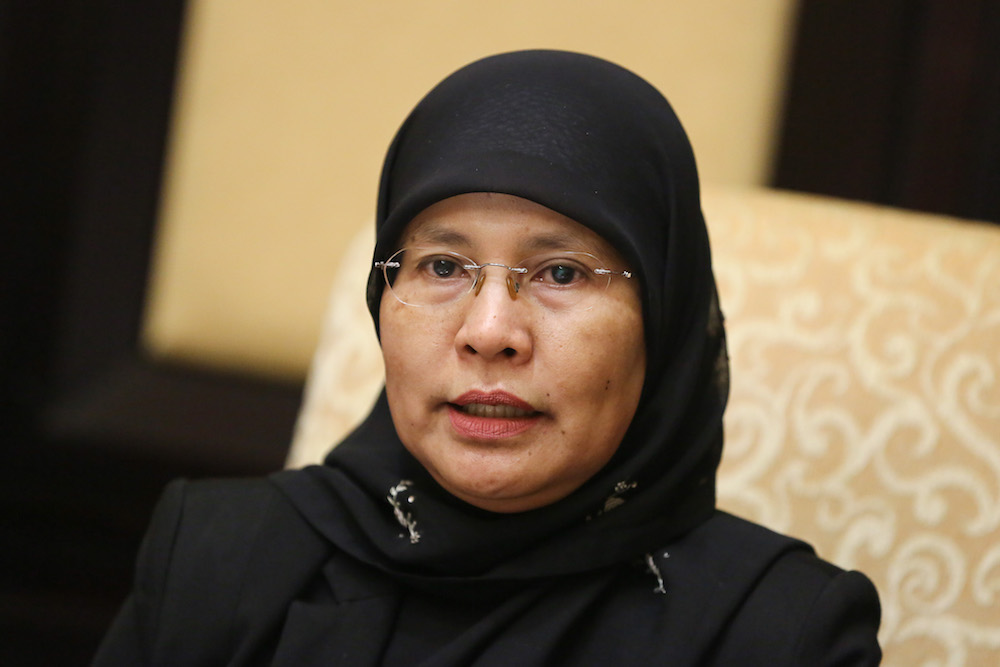PUTRAJAYA, Jan 3 ― Judges sitting in Malaysian courts at all levels have managed to decide on 90 per cent of court cases based on the required timeline, Chief Justice Tan Sri Tengku Maimun Tuan Mat said today.
Tengku Maimun acknowledged the hard work put in by all judges in the past year.
“Everybody has been working hard. We have disposed of cases; almost 90 per cent of the cases all across the board at all levels have been disposed of according to the timeline. They have nine months to complete for civil cases and 12 months for criminal cases.
“And I think generally the judges have been working very, very hard so that itself we should be proud of that achievement,” she said, adding that it is up to the public to evaluate what the judiciary has achieved in 2019.
Tengku Maimun was responding to questions during the informal meet and greet session with the media in an event called the “Press Day”.
Tengku Maimun explained however that cases that were not completed according to the timeline could be due to factors such as those involved in the court cases pursuing interlocutory appeals or appeals on side issues related to the main lawsuit.
“Just to explain, sometimes the backlog is not because the judges were slow in dealing with the cases, but sometimes because of the appeals, like say interlocutory appeals.
“They have main suit in the High Court for example, and interlocutory appeals, some they were not happy ― they file [interlocutory appeals] in Court of Appeal, not happy at Court of Appeal file at Federal Court.
“So in the meantime, the main case got stuck in the High Court, so in that sense the delay was not because the judges were slow, were not doing their job, were not conscientious enough; but because of the unnecessary appeals that has been going up from one level to another which delayed the disposal of the main case. So that is one reason, just as an example,” she said.
Court cases typically involve time allocated for lawyers to prepare and exchange lengthy court documents with the other side, and also require judges and lawyers who are also handling other cases to find common free dates for court hearings.
When asked if the appointment of female judges for key positions in 2019 was an achievement, Tengku Maimun acknowledged that her May 2019 appointment as Malaysia’s first female chief justice was viewed as an achievement for the country, but stressed on the need to carry out one’s responsibilities well.
“To me, really gender is not a matter whether the CJ is a male or female, the responsibility is just the same. You just need to discharge your responsibilities well regardless of your gender.
“But in terms of perception by the public and organisations, women organisations especially and the other foreign jurisdictions, the foreign judiciaries, they see the appointment of the first female chief justice in Malaysia as one big achievement. So I guess it is an achievement for Malaysia, and on a personal note, it is an achievement but not so much because it has anything to do with gender.
She pointed out that Malaysia does not experience scenarios such as rape victim or female domestic abuse victims not obtaining justice when the judge in their cases is male, saying that a judge’s gender is not an issue: “Gender is not actually a factor in discharging our responsibilities.”
2019 was also significant as a series of fresh appointments in December saw Malaysia having its first female Court of Appeal president with Datuk Rohana Yusuf’s elevation, while also increasing the tally of female judges at the Federal Court.
Out of the 13 Federal Court judges in December 2019 including the top four judges, six of them are female.

Earlier today, two new judicial commissioners were appointed to the High Court via an oath-taking ceremony at the Palace of Justice.
These two are former Perak state legal adviser Datuk Rohana Abd Malek who will be 61 this December 19, and former private lawyer Tee Geok Hock who will be 62 on February 17, with both ceasing their positions after taking up their new posts.
Rohana holds an advanced diploma in law from Universiti Teknologi MARA and a Masters’ in law from University of Dundee, Scotland, and had held numerous positions relating to law including in the Attorney-General’s Chambers, as legal adviser in the Human Resource Ministry and the Ministry of International Trade and Industry, as well as the director-general of the Insolvency Department.
Tee is a Universiti Malaya law graduate who was a federal counsel in the Attorney-General’s Chambers in the 1980s and as legal manager at the IJM Group of Companies from 1983 to 1995.



















